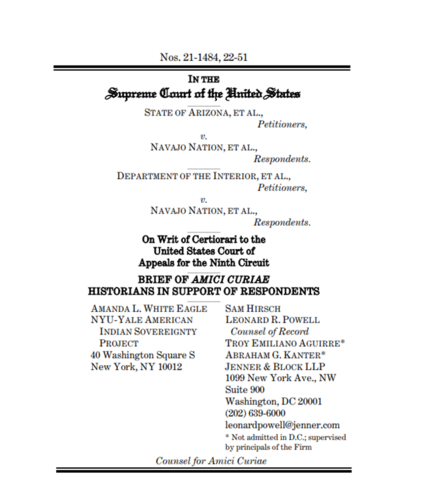Sovereignty Project Files 5th Brief in Navajo Nation Water Case

The Supreme Court recently heard oral arguments in the consolidated cases Arizona v. Navajo Nation. The consolidated cases consider the United States’ obligation to the Navajo Nation, specifically its obligation under the federal trust doctrine to appropriately manage the Nation’s reserved water rights in the Lower Basin of the Colorado River. The 1868 Treaty of Bosque Redondo established the Navajo Reservation as the permanent homelands for the Navajo, and though the United States and the Nation agree that the tribe has a right to water, parties disagree over the scope of the United States’ responsibility to ensure the tribe has adequate water.
In February, the NYU-Yale American Indian Sovereignty Project filed its fifth amicus brief with the Supreme Court in support of the Navajo Nation. The Sovereignty Project’s Clinical Fellow Amanda L. White Eagle filed the brief with the Project’s partner Jenner & Block LLP and with the assistance of Professor Ned Blackhawk at Yale University, Professor Maggie Blackhawk at New York University School of Law, Elizabeth Ellis at Princeton University, Joshua L. Reid at the University of Washington, and Karl Jacoby at Columbia University.
The brief aims to help the Court understand the history of the trust doctrine as it relates to the United States’ obligation to secure the Navajo Nation’s water rights in this case. Three conclusions relevant to the case can be drawn from the historical record outlined in the Sovereignty Project’s brief.
The first conclusion is that the trust doctrine shapes this case because it sheds light on the parties’ intent in negotiating the 1868 Treaty of Bosque Redondo. In broad terms, the trust doctrine refers to the United States’ legal obligation to provide for the protection and care of Native people, and it stems from treaties and the incorporation of Native lands into federal trust. Thus, in this case, the federal government and the Navajo Nation understood that the United States was compelled to negotiate the treaty in good faith because of the United States’ obligation under the trust doctrine. This context must be understood to interpret the treaty which created the Navajo Reservation.
The second conclusion is that the application of Winters v. United States to this case is straightforward. At a basic level, the Winters doctrine says that when Congress reserved certain lands as permanent homelands for tribes, it did so to ensure the tribes could sustain the land as homelands, which necessarily requires permanent access to enough water. In this case, the treaty establishing the Navajo Reservation should be interpreted to include a right to enough water to meet the needs of the tribe.
The third conclusion is that to fulfill the trust doctrine, Congress intended for robust judicial enforcement of treaty obligations. In the past, Congress reserved the task of ensuring the fulfillment of treaty obligations, but today, Congress has primarily tasked the courts with that responsibility. Thus, the Navajo Nation’s suit compelling the United States to fulfill its treaty obligations was properly brought before the court.
The U.S. District Court of Arizona dismissed the Nation’s breach of trust claim and denied leave to amend, but the Ninth Circuit reversed this decision, holding that the Nation should be permitted to amend its breach of trust claim. The United States filed a Petition for Certiorari stating that amendment would be futile because the Navajo Nation cannot establish that the United States owed it any duty. The states of Arizona and Colorado intervened below asserting that the Ninth Circuit lacked subject matter jurisdiction because the Supreme Court retained jurisdiction over this case in Arizona v. California.
The legal issues before the Supreme Court in the consolidated cases are: (1) whether the Ninth Circuit’s opinion infringes on the Supreme Court’s retained jurisdiction over the allocation of water from the Lower Basin of the Colorado River and (2) whether the United States has a judicially enforceable duty to the Navajo Nation related to the Nation’s reserved water rights.